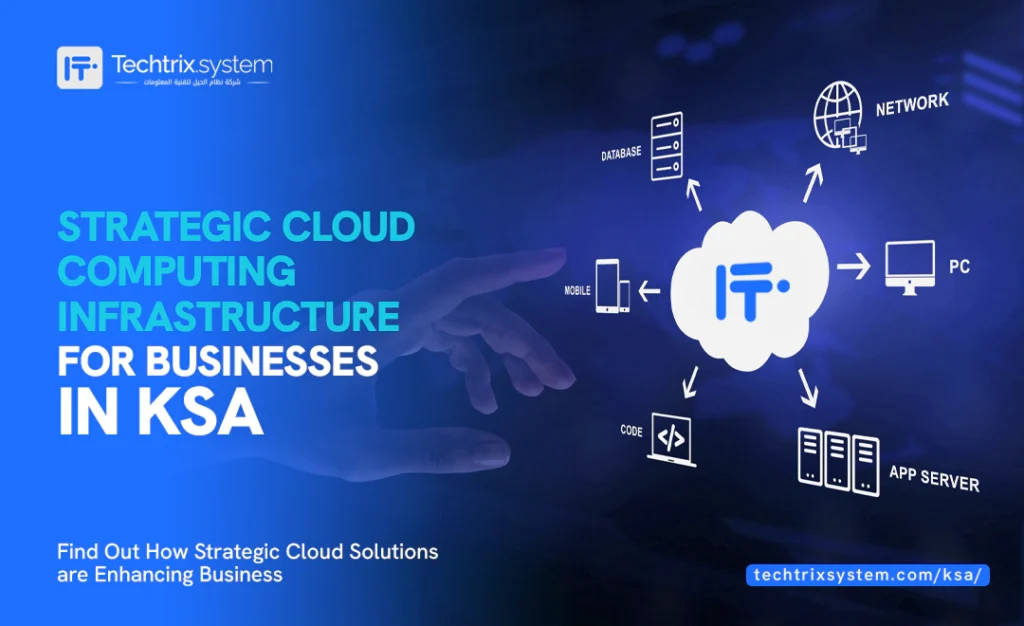Cloud Computing Infrastructure and Its Benefits to KSA Business in 2024

Reaching New Heights: Saudi Arabia’s Cloud Market Evolution
“Reaching for the clouds might seem like an overwhelming task, but for businesses in Saudi Arabia, it’s a game-changing opportunity.”
Finding a reliable Cloud Computing Infrastructure in Saudi Arabia has been a challenge in the past. However, the race to the cloud is accelerating as Saudi Arabia positions itself as a leader in the Cloud Computing market. At the forefront of this transformation is the Kingdom’s ambitious Vision 2030 program, a roadmap designed to diversify the economy and boost technological Infrastructure across various sectors. The Cloud Computing strategy of Saudi Arabia is to speed up the use of Cloud Computing services by requiring organizations to think about cloud options when they make new IT investment choices. This strategy aligns with the main goals of Saudi Arabia’s Vision 2030 initiative. By prioritizing investments in information and communication technology (ICT), Saudi Arabia aims to build a digital economy capable of competing on the global stage. This visionary initiative underscores the critical role of Cloud Computing in enabling businesses and government entities to streamline operations, enhance efficiency, and foster innovation.

Government of KSA Active Involvement in Cloud Infrastructure
The Saudi government is heavily investing in cloud Infrastructure. The introduction of the Cloud First Policy in Saudi Arabia in 2018 marked a strategic shift. The Cloud First policy of Saudi Arabia mandates that government agencies prioritize Cloud Computing solutions for new IT projects. This initiative aims to enhance efficiency, security, and innovation across public sector services by leveraging cloud technologies. These initiatives ensure that cloud service providers meet stringent security and compliance certifications, safeguarding businesses from threats. Moreover, the recent launch of the Cloud Computing Special Economic Zone on April 14, 2023, by His Royal Highness the Crown Prince further underscores Saudi Arabia’s commitment to advancing its ICT and innovation Infrastructure (Source). This initiative aims to create an ecosystem conducive to technological innovation and entrepreneurship, raise collaboration among industry players, and facilitate the development of cloud technologies.
The Adoption of Strategic Cloud Computing Infrastructure in KSA

The EMEA Cloud Business Survey 2023 found that 68% of Middle East companies plan to migrate most of their operations to the cloud within the next two years. The primary reason for this shift is cost efficiency. By moving to the cloud, businesses can significantly reduce their IT expenditures and focus more on innovation and growth. The annual spending on public cloud services in Saudi Arabia is expected to reach $3.9 billion by 2027, with an expected compound annual growth rate (CAGR) of 23.4%, according to research by the International Data Corporation (IDC) (Source). This rapid growth highlights the increasing reliance on cloud solutions to drive business efficiency and competitiveness.
Services for Enhanced Cloud Computing Infrastructure in KSA
Cloud computing services are categorized into three main types, each offering unique benefits:
Infrastructure as a Service (IaaS)
Provides virtualized computing resources over the internet, allowing businesses to rent Infrastructure such as servers, storage, and networking. This model offers flexibility and scalability, enabling businesses to scale resources up or down based on demand.
Platform as a Service (PaaS)
Offers hardware and software tools over the internet, primarily for application development. PaaS provides a platform for developers to build, deploy, and manage applications without worrying about underlying Infrastructure.
Software as a Service (SaaS)
Delivers software applications over the internet, on a subscription basis. SaaS applications are accessible from any device with an internet connection, simplifying software management and reducing costs.
Understanding Dynamic Hyper-Converged Infrastructure in KSA
Hyper-converged Infrastructure (HCI) is a software-defined IT framework that combines storage, computing, and networking into a single system to reduce data center complexity and increase scalability. HCI integrates these components into a single solution, managed through a common toolset, which simplifies management and operations. This Infrastructure is essential for businesses looking to optimize their operations and reduce costs. At its core, HCI offers an efficient approach to managing IT resources. By centralizing control through a unified interface, businesses experience improvements in resource allocation and oversight. This not only reduces complexity but also improves the responsiveness of IT Infrastructure to changing demands. One of the key advantages of HCI lies in its scalability. Saudi Arabia Businesses can effortlessly expand their Infrastructure by adding more nodes as needed, without the need for extensive reconfiguration or disruption. HCI drives significant cost efficiencies by combining resources on a single platform. By optimizing resource utilization, HCI enables KSA businesses to achieve more with less, thereby enhancing overall cost-effectiveness.
Difference between Private, Public, and Hybrid Cloud Infrastructure in KSA
Aspect | Private Cloud | Public Cloud | Hybrid Cloud |
Ownership | Owned and operated by a single organization | Owned and operated by third-party providers | Combination of private and public clouds |
Security | Shared responsibility between provider and customer | Full control over security | Shared and dedicated security measures |
Cost | Pay as you go | Lower due to shared resources | Variable, based on configuration |
Scalability | Limited | Highly scalable | Scalable but requires planning and coordination |
Management | Managed by the organization | Managed by the service provider | Managed by both |
Deployment | Off premises | On premises or Off premises | Combination of public and private cloud |
Infrastructure | Shared with other users | Dedicated to single organizations | Shared and dedicated resources |
Benefits to Business in KSA Due to Advanced Cloud Computing Infrastructure

General Benefits of Cloud Infrastructure for Businesses in KSA
- Significant reduction in IT costs by eliminating the need for physical hardware and maintenance.
- Ability to scale resources up or down based on demand, ensuring optimal performance.
- Access to data and applications from anywhere, at any time, facilitates remote work and collaboration.
- Advanced security measures protect data from breaches and cyber-attacks.
- Disaster recovery solutions ensure business continuity.
- Rapid deployment of applications and services, reducing time-to-market.
- Enhanced tools and platforms for team collaboration and communication.
- Efficient data storage, management, and retrieval capabilities.
- Easier compliance with industry standards and regulations.
- Unrestricted resources for innovation and strategic initiatives.
Before and After: Industry Transformation in KSA through Cloud Computing:
Industry | Before Cloud Adoption | After Cloud Adoption |
Healthcare | High IT costs, manual record-keeping, limited data access | Reduced costs, digital records, and easy access to patient data |
Retail | Limited online presence, manual inventory management | Enhanced e-commerce capabilities, automated inventory management |
Banking | Slow transaction processing and limited online services | Faster transactions, comprehensive online banking services |
Education | Traditional classroom setting, limited remote learning | Hybrid learning models, extensive online resources |
Manufacturing | Manual production tracking, high maintenance costs | Automated production tracking, predictive maintenance |
Industry-Specific Benefits of Scalable Cloud Computing Infrastructure in KSA
Strengthening Cloud Computing for the Digital Future of Businesses in KSA
In 2019, Saudi Arabia passed a law requiring all cloud service providers to meet security and compliance certifications. This law ensures that businesses using cloud services are protected in the cyber security department. The government’s proactive approach to fortifying cloud Infrastructure makes it a reliable choice for companies looking to secure their data. Compliance with these regulations is critical for businesses to protect sensitive information and maintain customer trust. Research found that around 90% of companies in the region have moved beyond the “lift and shift” strategy and are now modernizing their applications and creating new, cloud-native solutions. This shift indicates a future where Cloud Computing is integral to business operations. As businesses continue to innovate, the demand for advanced cloud solutions will grow, fostering a cloud-driven future.
The Effect of Global Pandemic on Cloud Infrastructure in KSA
The Covid-19 pandemic accelerated the adoption of cloud Infrastructure. The expansion of e-commerce in Saudi Arabia, which grew by almost 60% in 2020, highlighted the necessity of cloud solutions. This market is expected to reach SAR50bn by 2025 (Source), with many companies adopting cloud Infrastructure to support their operations. The pandemic underscored the importance of digital transformation, driving businesses to invest in cloud technologies to ensure business continuity and resilience.
Techtrix system Arabia Offers Premier Cloud Services in One Place
In Saudi Arabia, Techtrix System Arabia has led the way in Cloud Computing. We provide full cloud operations, including administration, updates, and planning and execution. To provide a variety of safe and secure cloud services, we have partnered with international cloud service providers like Alibaba that provide efficient services throughout the world. Because of this partnership, we are able to offer private, public, and hybrid cloud solutions that fit the particular requirements of Saudi Arabian organizations. Many Saudi enterprises have come to rely on us as a reliable partner as they start their cloud journey because of our dedication to quality and client satisfaction.
In conclusion, Cloud Computing Infrastructure is revolutionizing the business landscape in Saudi Arabia. With the government’s support and strategic initiatives like Vision 2030, the Kingdom wants to become a regional tech hub. At Techtrix System Arabia, we are committed to providing the best cloud solutions to help businesses succeed. By utilizing our expertise and state-of-the-art Infrastructure, we enable businesses to achieve their digital transformation goals and stay competitive.
FAQs
They benefit from reduced IT costs, scalability, and access to advanced technologies.
They include data breaches, compliance with local regulations, and data sovereignty issues.
Cloud computing facilitates innovation, efficiency, and scalability needed for digital transformation across industries.
Providers must comply with Data Cybersecurity Controls, Operational Technology Cybersecurity Controls, and the Personal Data Protection Law.
It reduces the carbon footprint by optimizing server utilization and reducing energy consumption.
Governments are increasingly adopting cloud-first policies to enhance service delivery and efficiency.
HCI simplifies IT management, enhances scalability, and reduces costs by integrating storage, computing, and networking.
Public clouds offer shared resources, private clouds provide dedicated environments, and hybrid clouds combine both models for flexibility.
Businesses experience cost savings, improved productivity, and accelerated innovation through cloud adoption.
